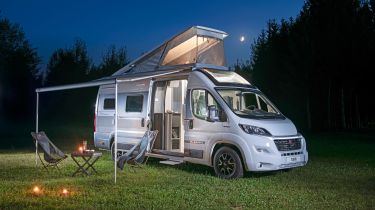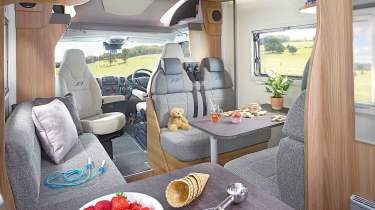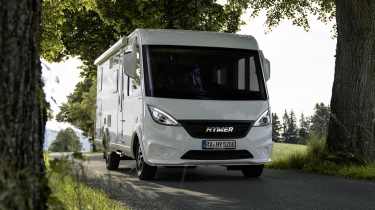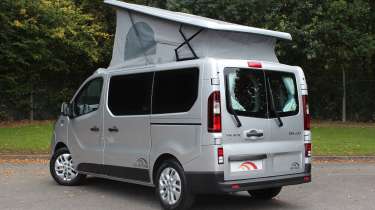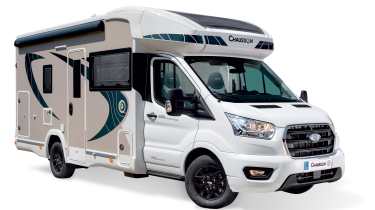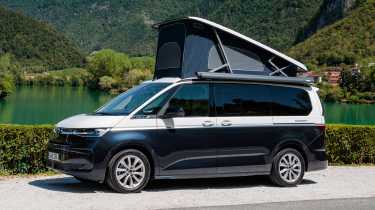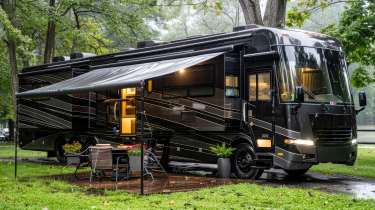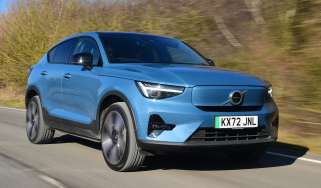Buying a motorhome in the UK: beginners’ guide and advice
We guide you through the dos and don'ts of buying a motorhome
Buying a motorhome in the UK can open up all sorts of dream travel opportunities, but you’ll need to know what to look for in order to prevent any camping-related nightmares. No need to fret, though, as we’re here to help with our complete beginners’ guide to buying a motorhome.
What to look for when buying a motorhome
There are a wide range of shapes and sizes to choose from on the UK’s motorhome market, and the sheer amount of variety on offer might surprise you. As with any vehicular purchase, though, it’s important to predetermine exactly what you need from your motorhome, such as the number of berths (sleeping capacity), amenities, storage space and, of course, purchase price.
Even the smallest motorhomes have plenty of things that can potentially go wrong, so a careful eye and a bit of research will go a very long way. Even if you’re lucky enough to be buying a brand-new motorhome, it’s always worth taking a look on owner’s forums for any common pitfalls with the model that’s caught your eye. A browse of the classifieds will also help to give you an idea of what current prices look like, too, which could work in your favour when negotiating on a final purchase.
Naturally, you’ll also need to take running costs into account. Most motorhomes are big vehicles, and some have an equally large thirst for fuel. The Volkswagen Grand California, for example, only has an official fuel economy figure of up 26.2mpg on the WLTP combined cycle. Insurance and VED road tax can also take their fair share out of your budget, so it’s important to ensure that you can afford everything before signing on the dotted line.
If you’re completely brand-new to the world of motorhomes, we recommend renting one before moving onto a potential purchase. This is a great way to get a feel for driving and living in one without any major financial commitments, plus it’s an excuse to take a holiday.
Once you’ve found the perfect motorhome and have confirmed that you can afford it, it’s now time to take a look at it in the metal. It’s here where you’ll want to be extra thorough, particularly if you’re looking at a used motorhome. Here are some of the key things to inspect:
- Background check: Just like when purchasing a used car, the first port of call when looking at a potential motorhome purchase is a history check. A full report, such as an HPI check, does come at a cost, but it’ll reveal whether the vehicle has ever been written-off or stolen, so it’s well worth paying for this peace of mind.
- Brakes and tyres: Many motorhomes sit unused for long periods of time and then cover hundreds of miles, and this can take a real toll on the brakes and tyres. Check that all four tyres are in good condition and still have plenty of tread without any flat spots, cracks or punctures. Many motorhomes also require specialised tyres rather than regular rubber, so make sure these are fitted, too.
- Bodywork and chassis: As with any other type of vehicle, it’s crucial to check a motorhome for imperfections such as accident damage, rust or bad repairs. A few cosmetic scuffs and scrapes aren’t necessarily a dealbreaker, but they could be a nice way to get a few pounds off the asking price. If you notice any structural damage or think there are further problems being hidden, just walk away.
- Interior: People often live in their motorhomes for weeks on end, and it’s the interior that’ll take the brunt of this. Make sure all of the specified kit is present and correct, including items such as cushions or mattresses. Many vans are also fitted with removable gas canisters and although these aren’t always expensive to fill, the bottles are often sold on a deposit basis, so make sure these are where they should be. Also take a moment to check that any built-in appliances are in working order. Older motorhomes (especially conversions) are also susceptible to condensation which can result in unwanted smells, so keep an eye out.
- Maintenance: Regardless of whether a motorhome covers thousands of miles a year or sits on a driveway for most of the time, maintenance is essential. These vehicles are seldom cheap, so make sure any prospective purchase has a full service history. Conducting an online MoT history check can also help to give some insight into how the motorhome has been cared for in the past, and invoices for previous work are always a welcome sight, too.
- Paperwork: As with any vehicle, your new motorhome should come with a V5C logbook and a service history book. The difference with motorhomes compared to cars, though, is that they should also be provided with an engineer’s report stating that all gas and electrical fittings meet the necessary safety standards.
- Sanitation: You don’t need us to tell you that health and hygiene are crucial, so ensure that the motorhome’s water tank is clean and free from mould. Also check that any built-in basins, toilets, showers etc. are clean and functioning correctly, and that the on-board boiler is working as it should be.
- Security: The last thing anyone wants is someone snooping around their new pride and joy, so make sure that every lock is functioning correctly, as well as the alarm and immobiliser (if fitted).
- Test drive: Take the motorhome for a test drive and check for issues such as poor running, a crunchy gearbox, knocks and bangs etc. If you aren’t mechanically minded, it’s worth paying for an expert to come with you. If a seller is reluctant to allow test drives or inspections, they’re probably hiding something so walk away.
Types of motorhome
Some are more common than others, but there are a number of different types of motorhome that you can buy. Whichever one is right for you will largely depend on your personal requirements, tastes and budget.
A-class motorhomes
A-class motorhomes are some of the most luxurious models on the market, and they’re also some of the largest and most expensive to buy. These vehicles typically range between 25 to 40 feet in length, so they can easily accommodate large families. Many A-Class motorhomes exceed 3,500kg in weight, though, so they can’t be driven on a regular car licence.
Van conversions
This one is pretty self explanatory, but van conversions are panel vans which have been transformed into motorhomes. These vehicles are either built by DIYers or specialist companies, and some of the results are highly impressive. Some conversions are much cheaper than the equivalent factory-built models, too.
Coachbuilt motorhomes
Coachbuilding may evoke a mental image of pre-war luxury cars, but it also applies to motorhomes. These vehicles utilise a pre-built chassis (many examples are based on large vans like the Ford Transit and Fiat Ducato) and then the motorhome manufacturer adds its own body on top.
Camper vans
A camper van (sometimes referred to as a Class B motorhome) is a van-based motorhome that has been entirely constructed in-house by a manufacturer. The Volkswagen California is one of the best known examples of this type of vehicle, but other models are available, too, such as the Ford Transit Custom Nugget and Citroen Holidays.
Recreational vehicles (RV)
Class A motorhomes are big, but recreational vehicles are even bigger. These opulent machines are more popular in the USA than they are here in the UK, but the level of luxury on offer is almost mind-boggling. The purchase and running costs of these behemoths tend to be equally unbelievable, too. If you’re thinking of treating yourself, just remember that RVs tend to be similar in size to a passenger coach, so they’re not very easy to drive.
Buying a new or second-hand motorhome
Deciding whether you should buy a brand-new or second-hand motorhome will probably boil down to how much you can afford to spend on your home from home. Brand-new motorhomes, even the smallest ones, are expensive to buy but they’re far less likely to have any mechanical issues or other lurking problems. However, used motorhomes that have been well cared for aren’t too hard to find, and finding the right one could save you a small fortune. Here are some of the pros and cons of buying a new or used motorhome
New motorhomes
Pros
- You can order to your exact specification
- No risk of neglected maintenance or cleaning
Cons
- Initial depreciation hit
- You may have to pay extra for mod cons
Second-hand motorhomes
Pros
- Potentially huge savings
- Mod cons might be included
Cons
- Higher risk of encountering problems
- Some examples might not include warranty cover
Frequently Asked Questions
If you can afford one, have the space to park it up and genuinely want one then buying a motorhome is a good idea as it can open up a whole bunch of travel opportunities and save you plenty on hotel rooms.
Ready to take a trip? These are the best motorhomes...

